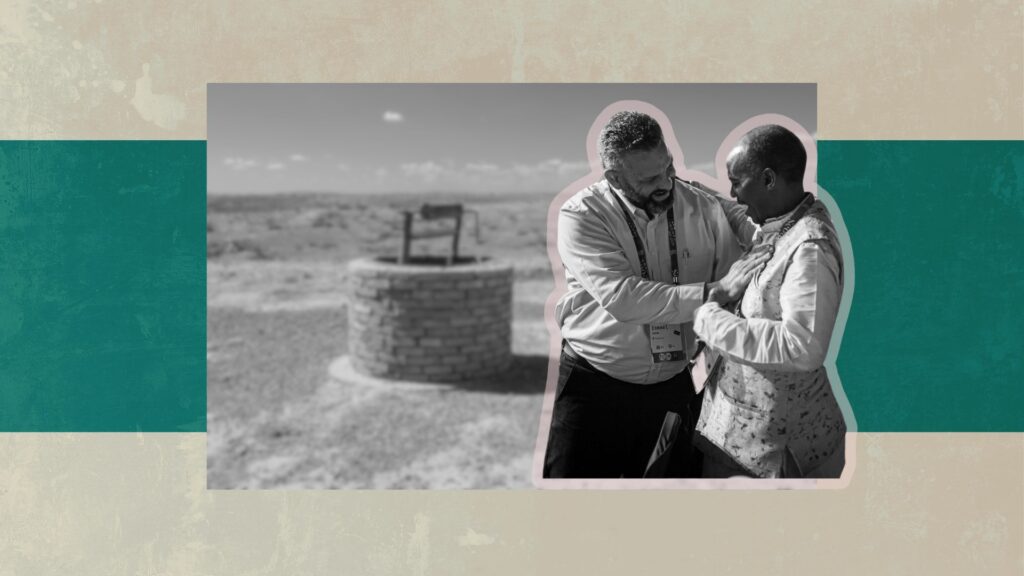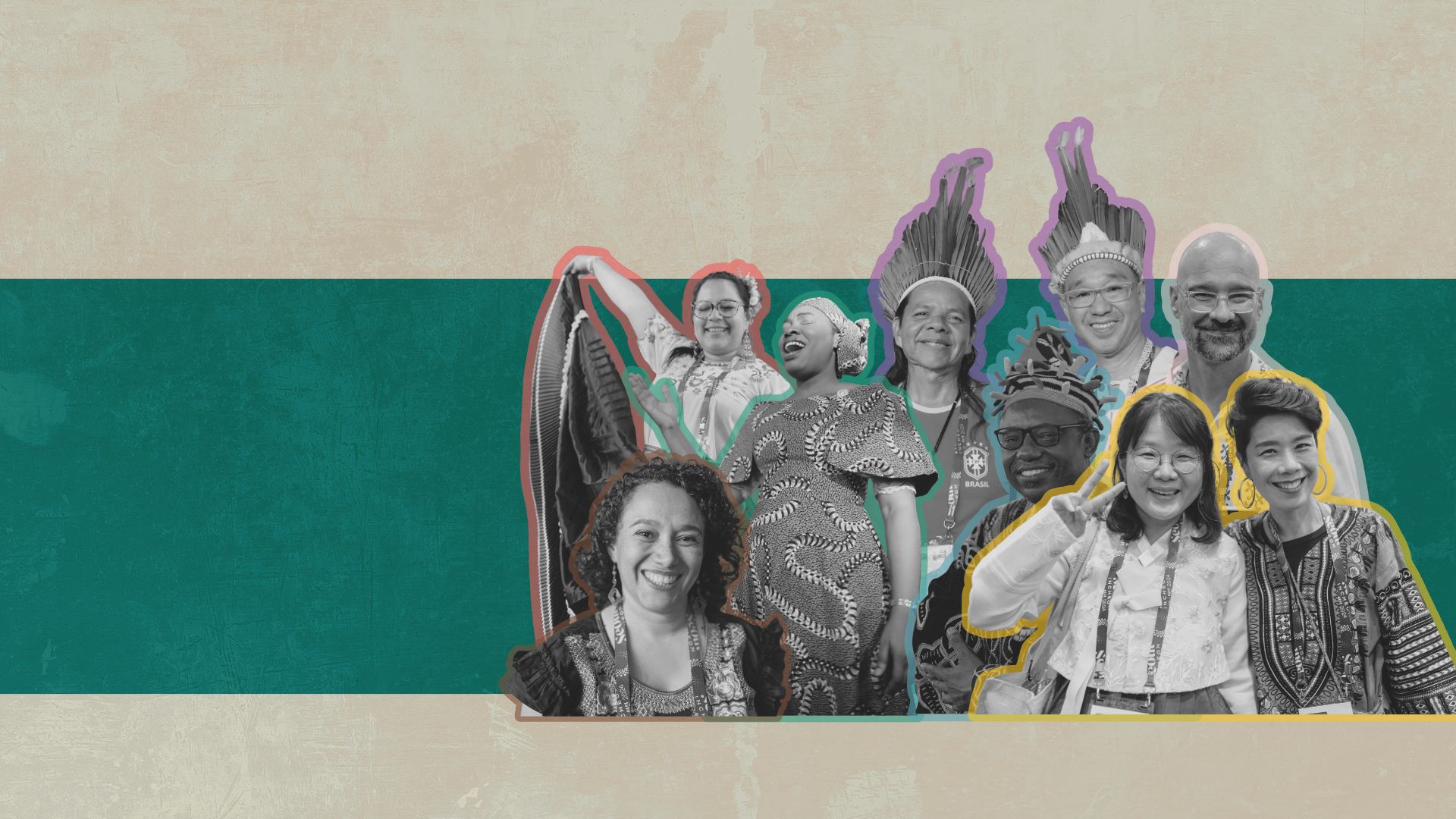I was born the year the civil (ethnic) war in Sri Lanka began. The bitter conflict lasted for 26 years, claiming around 100,000 lives. It was between the majority Sinhalese government and a Tamil separatist group known as the Tamil Tigers. Long-simmering ethnic tensions cast a shadow over our otherwise beautiful island nation. The church, home to both Sinhalese and Tamil Christians, has wrestled with what it means to be the family of God. Phrases like ‘Unity in diversity’ are often heard. However, they miss the essence of what it truly means to be ‘one’. I fear the church has diminished the wonder of our oneness in our efforts at reconciliation. A firm understanding of our oneness must then proceed to a celebration of our diversity.
Recovering the Wonder of our Oneness
One of the great miracles of the cross, outside our salvation, was that God was bringing together a people and making them irreversibly one. Through the work of the Spirit, believers are incorporated into ‘one’ body (1 Cor 12:13). In his letter to the Galatians, Paul concludes a beautiful section on our justification by faith with a weighty set of conjunctions (3:27-28):
For as many of you as were baptized into Christ have put on Christ. There is neither Jew nor Greek, there is neither slave nor free, there is no male and female, for you are all one in Christ Jesus.
Paul first mentions two realities of our oneness (v27); Firstly, we are baptised into Christ. Secondly, we have all put on Christ like a garment! Paul then buttresses this truth using a string of conjunctions: ‘neither’, ‘nor’, and the negative, ‘no’ (see also Col 3:11)
To say there is ‘no more male and female’ seems absurd! Yet the Holy Spirit ensured this strong language was used to emphasize our new oneness. In his letter to the Ephesians, we again see strong language. Paul talks about the work of Christ to ‘create in himself one new man in place of the two… thereby killing the hostility’ (Eph 2:15b-16). Yes, the New Testament in other places makes much of these various identities important to us. However, there is a message here that must not be overlooked.
Paul could have taken the route of saying, ‘Yes, there are Jews and Greeks, we are different, but we are united in Christ.’ That would be similar to ‘unity in diversity’. But by saying no more Jew nor Greek, he is stressing a new reality of oneness. The marriage union helps understand this. My wife and I are not two different people trying to be united. We are one body; therefore, we unite.
The church can draw parallels from this truth. The NIV rendering of Romans 12:5 says, ‘so in Christ we, though many, form one body, and each member belongs to all the others.’ Therefore, I can tell my Tamil brother, ‘You are mine!’ In the world, there is unity in diversity, but in the family of God, there is unity in oneness.
On June 21st, 1991, a suicide bomber belonging to the Tamil Tigers drove a truck laden with explosives into the Joint Operations Command Office that was outside my school. I was 8 years old. I remember first seeing the ceiling of my classroom coming down, followed by the sound of the explosion. Many were injured, and at least 21 were killed. My father was at a meeting a few kilometers away. I think he broke the speed limit and jumped over a few walls in search of me. A few of his colleagues also came looking for me. However, Pandian (then 29) was the first person to find me. He was my father’s Tamil colleague. The site of a suicide bombing was a dangerous place for young Tamil people to be, as the army would be out to get them. Pandian was rushing in when a young Tamil man should have been fleeing such a place! He was the first to find me. Why? Because in the family of God, we are one!
Healing can begin as we become aware of our inherent oneness.
Fractured relationships in the church abound. Healing can begin as we become aware of our inherent oneness. Having first embraced our oneness, we can then appreciate the beauty of what makes us different.

Embracing Multi Ethnic Beauty
In Acts 2, on the day of Pentecost, we witness an unusual phenomenon not mentioned again in the book of Acts. The disciples spoke in the native languages of the different people groups present. Jewish pilgrim festivals, like Pentecost, brought people from the far corners of the earth to worship God. And through the miraculous work of the Holy Spirit, these people were hearing the wonders of God in their native languages!1 It seems God was making a statement. The table of nations mentioned before this spectacle is noteworthy (Acts 2:5-12). Tim Keller notes that the only other place in the Bible we find such a table of nations is before the tragedy of Babel.2
At Babel, God confused the people’s language, divided them, and scattered them. At Pentecost, we see a scattered people of many languages coming together. Rather than speaking to them in one language, the Holy Spirit speaks to them in their own languages. Instead of Babel’s confusion, there is understanding. Instead of division, there is oneness, as 3000 people that day became children of God.
What was the intention of the Holy Spirit? Why not hear the wonders of God in a common language like Hebrew or Greek? As I’m sure everyone at least partially understood those languages. The language is the soul of an ethnos. In this unique moment when people from all nations had gathered, the Holy Spirit was creating oneness without asking people to give up what is important to them. So at Pentecost, Babel was reversed and renewed—as the various languages were preserved under a new oneness. The Holy Spirit was creating oneness while protecting the beauty of what makes us different.
In the book of Revelation, we see a grand vision of this beauty. The new Jerusalem will be enriched, because ‘the kings of the earth will bring their splendor into it’ and ‘the glory and honor of the nations will be brought into it’ (Rev 21:24, 26). Perhaps the African churches will show us how to dance joyfully in the new heaven and earth! So with this grand vision before us, we embrace our oneness and celebrate the beauty of what makes us different. In the world, there is unity in diversity. But in the family of God, we can go a step further. In the family of God, there is unity in oneness and beauty in diversity.

Oneness vs Sameness
Imperial structures try to bring sameness. And in the church, some mission movements homogenize the church and subject people to the movements’ own culture.3 We must follow the Holy Spirit, who was creating oneness while protecting the soul of the ethnos. I have found the people in my church struggling to sing Western hymns translated into the Sinhalese language. The language is familiar, but the music is distant. People must sing rich biblical truths in a musical style close to theirs. Despite a new global culture evident mostly among youth, deep-rooted aspects of a local culture are innate to a person’s core identity. J Samuel of the Lausanne Freedom & Justice Network says, ‘Some reconciliation efforts dilute the uniqueness of minority identities. The church must be different.’4
‘Some reconciliation efforts dilute the uniqueness of minority identities. The church must be different.’
In light of all this, we must honour those who have often endured years of loneliness, translating the Bible into native languages. William Carey, cobbler turned missionary to India, translated the Bible into Bengali, Oriya, Marathi, Hindi, Assamese, and Sanskrit. He also translated parts of it into 29 other languages and dialects.5 What a labor of love for God’s people!
Gospel Humility Fosters Oneness
Ever since we were thrown out of the garden, people have been searching for a sense of significance. At Babel this is made bare as mankind “tried to make a name for themselves by reaching to the heavens” (Gen 11). The recent flurry of rockets built by the richest men in the world shows that the world hasn’t changed much. The rest of us who cannot reach the heavens are also working hard to make a name for ourselves as individuals, ethnic groups or nations.
Raising ourselves by our own strength opens the door to pride and the feeling of superiority. Erik Baker, historian at Harvard writing on the work ethic of modern entrepreneurs, says, ‘Herculean enthusiasm for work isn’t merely a way to get things done; it’s also a mark of innate superiority, a “superpower” that confers the right to impose their vision on the world.’6 This is not a far-fetched reality in the church. The seemingly ‘hard-working’, educated leaders/elders of a church often dominate decision-making, leaving those from impoverished backgrounds with little or no say.
Pride blocks us from looking up to God. Instead, it permits us to look down on people, often leading to the control of people. The gospel flips this story. Instead of us raising ourselves by our own strength, God raises us up and sits us in heavenly places! (Eph 2:5). Rather than finding our own significance, God gives us significance of cosmic proportions. Far from becoming proud, when we are raised, we are humbled. And the humble look up to God and even have the strength to look up to people; in humility, count others more significant than ourselves (Phil 2:3).

Counting Those of Other Ethnicities More Significant Than Ourselves
We see Jesus practicing this in his encounter with a woman from another race. The bitter ethnic tensions between Jews and Samaritans are more pronounced here as a Jewish man known to be righteous talks to a Samaritan woman known to be immoral.
Jesus doesn’t approach her and say, ‘Hi, I am Jesus, how can I help you?’ He comes in weakness and says, ‘Can you help me?’ If we are thirsty, we may not ask a beggar on the street to share his bottle of water with us. That would require much humility. I believe Jesus had such humility. Jesus is going lower than her, humbly asking for help, and treating her with respect and dignity
In ‘Youth for Christ’ Sri Lanka, the grassroots work is divided according to language. Sadly, this can look like an ethnic division too. Regardless, when the Tamil language clubs organize an evangelistic camp, the leaders humbly ask the Sinhala language leaders, ‘Please, can you help us?’ This happens vice versa too. The request is made in humility. In a Christian counter culture, there is dignity in dependence.7
The Sinhalese leaders would then respond to the request for help by doing some of the most menial work at the camp. Embracing a posture of servanthood means we consider those we serve as our masters, counting them more significant than ourselves. Jesus said, ‘For who is the greater, one who reclines at the table or one who serves? Is it not the one who reclines at the table? But I am among you as the one who serves’ (Luke 22:27). Jesus was like a waiter among us. He treated us sitting around the table with dignity, ready to take orders, prepared to serve. Here are two ways to practice humility. Humbly asking for help and humbly serving. At the end of these camps, we rejoice at the spiritual harvest and see Sinhalese and Tamil leaders walking across the campsite with their arms across their shoulders. Humility fosters oneness.
May we recover a biblical vision of a church where there is unity in oneness, and beauty in diversity. A church practicing gospel humility, treating others as more significant than ourselves. Such a church will be a light in a divided world, wooing the world to the One who reconciles all things to Himself.
Endnotes
- Tongues have various expressions in Scripture. Here it is different to that mentioned in 1 Corinthians 14:2 which says “For one who speaks in a tongue speaks not to men but to God; for no one understands him, but he utters mysteries in the Spirit”. Here it is tongues that people could understand. Three times it is mentioned that they heard them speaking in their own languages (Acts 2:6, 8, 10).
- Tim Keller, The Bible and Race, https://gospelinlife.com/article/the-bible-and-race/ accessed February 2025
- This is discussed in Ajith Fernando’s commentary on Acts; The NIV Application Commentary (1998), Harper Collins. pg 96
- J Samuel said this at a post conference discussion of the Lausanne Movement’s “Speak Up” global gathering held in Colombo, Sri Lanka in January 2025
- Encyclopedia Britannica (1998, July 20). William Carey | British Missionary, India Pioneer. https://www.britannica.com/biography/William-Carey
- Baker, Erik. “Elon Musk Is the World’s Richest Man. Why Is He Sleeping on an Office Floor?” The New Baker, Erik. “Elon Musk Is the World’s Richest Man. Why Is He Sleeping on an Office Floor?” The New York Times, February 27, 2025. https://www.nytimes.com/2025/02/27/opinion/elon-musk-billionaire.html
- The phrase was coined by John Stott. I have written an article on its impact on missions featured in The Gospel Coalition website. “No Mission Work Is an Island.” https://www.thegospelcoalition.org/article/mission-work-island/

